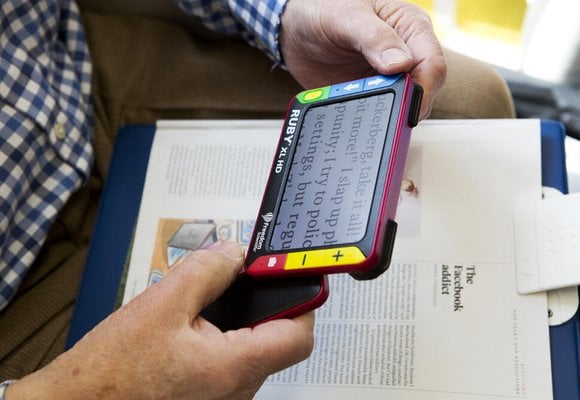Life skills – cooking
The cheapest and healthiest way to eat is by making your own meals, yet for some, rustling up a decent dinner seems a bit daunting.
So we talked to two blind students who encourage you to have a go and reassure you that you don't need to rely on snacks or less nutritious "ready meals". By taking on the challenge of learning new skills and getting used to new equipment, you'll soon learn what you can do, find things that work and perfect them with a bit of practice.
Mark's experience: cooking with a health grill
Mark from Birmingham told us: "It took me ages to build up the confidence to begin cooking and when I arrived at university I had only ever made things in Mum's microwave. I'm nervous around gas and electric hobs, and that hasn't changed. However, my mum bought me a health grill and I felt my independence increase overnight. I thoroughly recommend them to other blind students.
"You can buy one for less than £20, they're easy to use and clean, and you don't even need to follow a recipe for a good-tasting healthy meal. You place the grill on the table and just like a toaster, the lid opens up and back and you place the food on the bottom cooking surface. As the top lid has a cooking surface too, once you close the lid the food cooks on both sides at once so no turning is necessary. You can do vegetables and meat on the grill so can make full meals. My favourite is a chicken breast with Cajun spices on top and some carrots, onions and mushrooms and my girlfriend is always impressed when I make her this!
"The only trouble with my grill is not being able to see the indicator light. However, I use a talking food thermometer that tells me the temperature. Other gadgets I own are a liquid level indicator for pouring hot liquids, an auto chop which chops food automatically and safely, a talking timer, and a non-slip mat which makes sure things don't slip."
Emma's experience: get organized
Emma from Dublin told us: "Organisation in a kitchen is very important. It saves a lot of time and helps you make meals efficiently and easily. In a shared student house it can be difficult to arrange the kitchen in a way that helps make meals easy so don't be afraid to be assertive. Other students often don't keep the counters clear so I make sure that one stretch of the counter is kept clear and that my housemates respect that. The other areas of the kitchen they can do what they like with. Because I can't see the mess I have made I try to wipe the surfaces after every meal and have found that with trial and error you work out how many squirts of cleaning spray you need. I also clean more thoroughly every week to keep on top of things."
"Another suggestion is at the beginning of the year to arrange to be the first to move into your shared house. This way you can discuss any accommodations you need with the landlord. Although this is not always possible it really helped me because I negotiated to add a few accessible touches to the kitchen to be in place before the other students moved in. These included non-slip mats and bumps on the dials of the cooker and a cupboard away from the cooker where all my things are accessibly arranged. It is a compromise that works."
"My favourite way of cooking has to be using a slow cooker as you cut up the ingredients, pop them into the cooker when cold and walk away until hot, but I find using the oven and an electric hob much easier than before I came away to uni!"
More cooking tips
When you have a sight condition or can't see as well as you used to, cooking can seem rather daunting. But don't give up! By adapting how you work in the kitchen and using special equipment, a great deal can be achieved. Visit our cooking pages to find useful hints and tips to help you get started.
You can also find information and advice on magnification and our beginners guide to assistive technology helpful for when you are working in the kitchen.
Further support
Our team of regionally based Children, Young People and Family Support Officers are here to help. If you can’t find what you’re looking for, or you’d like to talk further about any of the above, then please get in touch with us by emailing [email protected] or calling us on 0303 123 9999.







